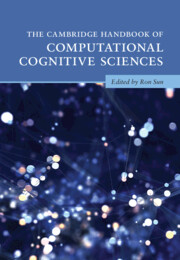
-
Select format
-
- Publisher:
- Cambridge University Press
- Publication date:
- 21 April 2023
- 11 May 2023
- ISBN:
- 9781108755610
- Dimensions:
- Weight & Pages:
- Dimensions:
- Weight & Pages:
- Collection:
- Cambridge Handbooks of Psychology
- Subjects:
- Psychology, Psychology: General Interest, Cognition
You may already have access via personal or institutional login- Collection:
- Cambridge Handbooks of Psychology
- Subjects:
- Psychology, Psychology: General Interest, Cognition
Book description
The Cambridge Handbook of Computational Cognitive Sciences is a comprehensive reference for this rapidly developing and highly interdisciplinary field. Written with both newcomers and experts in mind, it provides an accessible introduction of paradigms, methodologies, approaches, and models, with ample detail and illustrated by examples. It should appeal to researchers and students working within the computational cognitive sciences, as well as those working in adjacent fields including philosophy, psychology, linguistics, anthropology, education, neuroscience, artificial intelligence, computer science, and more.
Reviews
‘Ron Sun shines fresh light on the complex mechanisms underlying human cognition, marshaling expositions from a broad range of experts. Volume 1 shows the diversity of paradigms that can be employed, from neural networks to Bayesian methods to dynamic systems, and then shows how these can be applied to model the underlying mechanisms. While these chapters alone would be worth the price of admission, Volume 2 then offers a rich array of further payoffs in areas ranging from vision, motor control and emotion to creativity and, even, morality.’
Michael Arbib - University of Southern California, USA
‘The Cambridge Handbook of Computational Cognitive Sciences is a great collection of useful chapters. Ron Sun has recruited a stellar set of authors. It will be an excellent resource for cognitive modeling and psychology. It belongs on every modeller's bookshelf and in their library. This book will be very helpful in my and my students' work. I want to read all the chapters, and I will need to read and cite most of them.’
Frank Ritter - Pennsylvania State University, USA
‘Computational models have been central to cognitive science since the 1950s, making important contributions to the design and testing of theoretical explanations of mind. Through chapters by an army of leading experts, this Handbook provides a remarkably broad overview of computational modeling. Researchers and students in cognitive science will find it indispensable.’
Paul Thagard - University of Waterloo, Canada
‘The original edition of this work was an invaluable starting point by which nonspecialists could find their way into this domain. Now, extensively revised and expanded from its original 753 pages to 1307 pages, it deserves careful attention by researchers and students alike.’
H. Van Dyke Parunak Source: Computing Reviews
Contents
Metrics
Altmetric attention score
Full text views
Full text views help Loading metrics...
Loading metrics...
* Views captured on Cambridge Core between #date#. This data will be updated every 24 hours.
Usage data cannot currently be displayed.
Accessibility standard: Unknown
Why this information is here
This section outlines the accessibility features of this content - including support for screen readers, full keyboard navigation and high-contrast display options. This may not be relevant for you.
Accessibility Information
Accessibility compliance for the PDF of this book is currently unknown and may be updated in the future.


